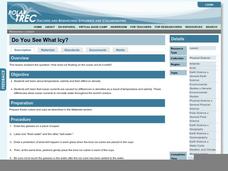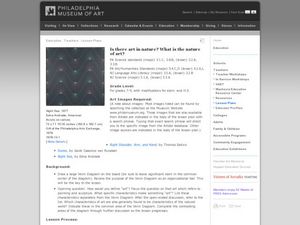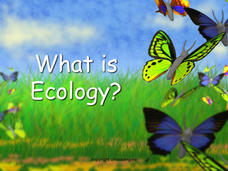American Museum of Natural History
What Do You Know About Astronomy
Develop an understanding of the universe. Learners answer 10 multiple choice questions about several topics in astronomy. Questions contain information about the age of the universe, gravitational attraction, galaxies, planets and comets...
Polar Trec
Do You See What Icy?
Here is a lesson that kicks off with a question. "How does ice floating on the ocean act as it melts?" As learners investigate this natural phenomenon, they'll discover that it has a lot to do with temperature, salinity, and the effect...
Philadelphia Museum of Art
Is There Art in Nature? What Is The Nature of Art?
It's always great to find cross-curricular lessons, especially when they integrate two very interesting topics. Learners will consider three paintings as they relate to both science and art. They'll discuss each piece and then respond to...
Curated OER
What is an Atlatl?
Let's go an an archaeological dig! Prepare your kids with a list of vocabulary terms relating to archaeology, including different types of items that one might find. They study pictures of each item and play a memory game based on the...
Constitution Facts
U.S. Constitution Crossword Puzzles: Basic #1
Reinforce U.S. Constitution facts with a crossword puzzle. Scholars show what they know by completing the 53 prompts.
Illinois Department of Natural Resources
Section One: What is Biodiversity?
Four intriguing and scientific activities invite learners to explore the natural resources of their town. The activities cover concepts such as genetic traits, organizing species in a taxonomy, the differences between different species...
Center for Civic Education
What Is Authority?
Young scholars examine the concepts of power and authority as they begin learning about government in this elementary social studies lesson. Through a series of readings, discussions, and problem solving activities, children...
K12 Reader
What Is a Glyph?
After reading a short passage about glyphs, kids must follow the provided directions to create a star glyph.
Scholastic
What a Character!
How do you know what traits a character displays in a story? Learners select a character and find list three traits for this character, explaining why they chose each trait. They then put this information together into a paragraph or essay.
Keep Your Children Safe
What Makes Me Afraid
Encourage scholars to be brave about feeling afraid with activity designed to enhance emotional intelligence. Learners share what makes them feel afraid then draw a face that appears scared.
California Department of Education
Etiquette? What’s That?
After watching a video, reading articles about etiquette in the workplace, and engaging in discussions, high school seniors create a presentation to show what they have learned about business etiquette.
Biology Junction
What Is Ecology?
Do you know the name for the biological study of interactions? A short presentation with accompanying worksheet introduces individuals to ecology. The materials offer a broad overview of the subject and the levels of organization to...
Curated OER
What Is Special About Polyethylene Food Storage Bags?
Students participate in an investigation in which they compare a polyethylene bag designed for recycling or disposal with a polyethylene food storage bag. Students use hexane to determine the differences between the low density...
Pennsylvania Department of Education
What is the Chance?
Fourth and fifth graders make predictions using data. In this analyzing data instructional activity, pupils use experimental data, frequency tables, and line plots to look for patterns in the data in order to determine chance. You will...
Academy of American Poets
Teach This Poem: "Spring is like a perhaps hand" by E. E. Cummings
E. E. Cummings' "Spring is like a perhaps hand" offers young scholars an opportunity to try their hands at analyzing a simile. After a warm-up activity and a close reading of the poem, class members discuss what they think the poem is...
Academy of American Poets
Teach This Poem: “One day is there of the series” by Emily Dickinson
A lesson plan begins with learners saying three words they associate with Thanksgiving dinner. They examine a picture of a menu from a Thanksgiving meal and discuss what they believe the artist wants them to feel, pointing out details....
Groundwater Foundation
How Wet Is Our Planet?
Here's a powerful demonstration that makes the point that it is everyone's responsibility to conserve water and protect the earth's limited supply of fresh water.
EngageNY
Evaluating an Argument: “Is Google Making Us Stupid?”
Does the Internet negatively affect peoples' brains? Scholars complete a Tracing an Argument note catcher to evaluate the question as they read the text "Is Google Making Us Stupid?" Exploring both sides of the issue, they add their...
Environmental Protection Agency (EPA)
Excuse Me, Is This the Way to the Drainpipe?
Elementary kids read and color the story of Willy Wetsworth, a drop of water, as he describes the journey that he and his friends take to provide fresh water to houses. He tells his story to Martha Merriweather, a little girl, and...
Curated OER
What Is a Neighborhood?
Students be asked to think about the neighborhoods in which they live, to consider what exactly makes up a neighborhood, and the current issues their neighborhood may be facing.
Curated OER
What is Science?
Students explore physical science by conducting a plant experiment. In this scientific method lesson, students discuss questions scientists ask in order to properly explore certain subjects. Students utilize two plants and place one in...
Curated OER
What is Prejudice?
Students tell who Rosa Parks was and what she did to become famous and what state she did it in, and who Martin Luther King Jr. was, why he was important in history, and how we was connected with Rosa Parks.
Curated OER
"What is an Engineer?"
Students describe and draw what an engineer looks like and does. They descrie what they think an engineer does. Students volunteer to read their description to the class. They use their knowledge as well as their classmate;s...
Curated OER
What is Coral?
Students discuss what they know about coral reefs and are introduced to the importance of preserving coral reefs. In this coral reef lesson, students make connections between coral ecology in the classroom and in the real environment...
Other popular searches
- What Is Inauguration
- What Is an Autobiography
- What Is Veterans Day
- What Is Democracy
- What Is Science
- What Is Gravity
- What Is Algebraic Expression
- What Is a Memoir
- What Is Culture
- What Is Anthropology
- What Is Contemporary Music
- What Is Home Economics























